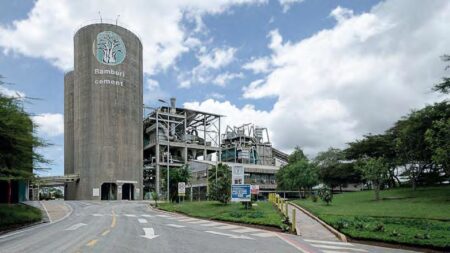
Youth unemployment is a global concern but in less developed countries, it makes the difference between economic stability and retardation.
For East Africa, youth unemployment endangers the future of the region, especially as the world moves more and more to a technology-based digital economy. The need to educate and create employment opportunities for youth is of more urgency now than ever before.
For example in Tanzania, the national unemployment rate for 2020 was 2.6 per cent, a 0.2 increase from the previous year. However, when you look at youth unemployment the figure is much higher. According to the International Labour Organisation (ILO) youth unemployment stands at r 13 per cent.
“This is why we have set up the Daraja La Ajira Expo,” explains Peter John (PBDT) CEO of the expo slotted for 26 through to the 29 of August in Dar es Salaam, Tanzania.
‘Daraja La Ajira’, which literally translates to ‘Employment Bridge’ is the leading live event that offers on spot learning on current and prospecting career opportunities for professionals in Tanzania.
It is also a B2B marketing event that connects the most proactive marketing professionals with the tools, techniques, and innovations they need to be at the forefront of the ever-changing marketing world.
“This is where professionals can build strategic alliances…it is designed to support, grow and connect professionals, it opens doors to career opportunities and business networking,” the CEO detailed.
The outcome of the event is expected to boost the development of professional careers in Tanzania. It is also expected to enhance professional networking and connections as well as increase awareness of various career opportunities to the professionals in Tanzania.
The Daraja La Ajira Expo is an annual event that brings together career experts from various fields including commerce, science and technology, media, engineering and medical sector to mention but a few as well as open up opportunities for graduates and B2B marketing.
Notably, the government has been doing a great deal to help create formal job opportunities as well as to empower youth to self employ. According to the Tanzania National Bureau of Statistics (NBS) unemployment in Tanzania has been decreasing annually. For example, unemployment decreased from 10.3 per cent recorded in 2014 to 9.7 per cent in 2018.
However, it is a daunting task that requires the support of the private sector and development partners. Events like the Daraja La Ajira Expo help to support ongoing government efforts to absorb youth into the formal sector as much as possible and to create skill development opportunities for others to self employed.
Employment VS Entrepreneurship
In Tanzania, over 800, 000 youth enter the job market annually, which is a huge number especially if you consider the fact that there are only about 40,000 formal job openings available in a given year. This means that over 760 000 youth are left to fend for themselves.
The number of available jobs is only one issue, youth employability is also faced with other barriers ranging from skills mismatch to a lack of soft skills. With no formal employment option on their table, this is where entrepreneurship comes into play, alias self-employment.
“Entrepreneurship presents a path toward economic independence for youth, particularly in areas where formal employment opportunities are scarce,” comments Techno Serve, an organisation that conducts a skill orientation course called the Pan-African Youth Entrepreneur Development (PAYED) programme.
The programme, which is conducted with the support of Citi Foundation, equips young entrepreneurs with the skills they need to gain formal employment or run their own businesses. With few formal sector jobs available, many turn to entrepreneurship. But without the practical skills to get started, entrepreneurship can present challenges.
Higher education discourse has long been dominated by the employability debate in an effort to ensure they produce graduates who are workplace ready.
In this aspect, four critical best practices for fostering graduate employability are of interest: university and industry partnerships, aligning university education with a country’s development plans, regular university curriculum reviews, and strengthening quality assurance systems.
However, while universities work to better prepare graduates for the workforce, the government and the private sector must step in and increase the employability of graduates who are already in the workforce.
This is where events like the Daraja La Ajira Expo come in. In effect, the expo helps increase the employability of the graduates by giving them career seminars and more directly by bringing them under one roof with employers.
At the Expo, youth will be able to have one on one meetings with employers and skilled developers. This chance to network with key stakeholders is vital to opening new opportunities for youth be it informal employment or in entrepreneurship.
Pan-African Youth Entrepreneur Development (PAYED)
Here are a few benefits that youth stand to gain by joining the PAYED programme conducted by Techno Serve in Tanzania.
- Professional effectiveness:Youth gain essential employability skills, identify potential careers, learn how to write a CV, prepare for interviews, and discuss employment barriers.
- Entrepreneurship:Youth begin to understand the characteristics of a successful entrepreneur and develop a personal mission and vision.
- Financial management:Youth learn how to separate personal and business finances, develop a cash flow budget, and identify different credit sources.
- Business planning:Participants learn how to generate business ideas, develop business plans, and present them to a group.
https://theexchange.africa/countries/kenya/kenyas-most-marketable-courses-for-employability-entrepreneurship/
Socio-economic effects of Unemployment
The effects of graduates not been unemployable range from poor economic development and psychological problems to social unrest in some countries. In Pakistan, for example, unemployment has been reported to trigger social unrest and psychological distress.
A study by Bilgiç and Yılmaz (2013) revealed a correlation between graduate unemployment and psychological health problems among the sampled graduates iin Turkey.
The same applies for Tanzania, with ever more graduates entering the workforce with no employment options the more we are seeing increased cases of non-communicable diseases and they are occurring at much younger ages than ever before.
Cases of crime, morals and ethics crumble are rampant from prostitution to drug abuse and crime.
“It is for this exact reason that we have set up the employment expo, the effects of employment to the individual, the family and the economy as a whole are devastating,” summed up the CEO of Daraja La Ajira Expo.











